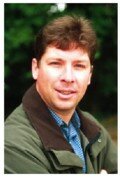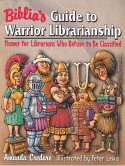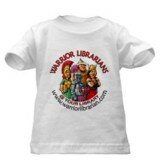|
 WLW: Can you briefly describe any experiences you had in school libraries as a child/student? WLW: Can you briefly describe any experiences you had in school libraries as a child/student?
I've been in libraries as long as I can remember. I used to go to our local library in Southern California all the time, checking out books on all types of subjects. I'm a fast reader, so I'd leave with armloads. Unfortunately, I'd always forget to return them on time, so I had quite the account on late fees. When I was a teenager, I spent my summers volunteering with the local library's reading program. The library was essentially my second home.
Aside from entertainment, I've always used libraries for information. As an elementary and high school student, I was fortunate to be at schools with good libraries and librarians. I quickly learned all the key things to know. Dewey Decimal -- sure, but the real key was understanding how to use a card catalog. Yes, I used to pull out drawers and write down numbers to find books on the right shelves. I always especially gravitated to the periodical databases, first the Reader's Guide, then the various electronic versions.
At UC Irvine, where I went to college, I continued using libraries for research purposes, primarily pulling down magazine publications for reference. In a foreshadowing of my current work, I also used to play with the Melvyl online card catalog, asking it to tell me how many references it had for subjects such as "history" or "love." Generally, it couldn't cope and gave up after trying 80 or 90 search cycles. I'm sure there's some sysadmin somewhere who hated this burden on the system!
My best and most professional library experience was when I was a research for the LA Times and a reporter for the OC Register. Newspaper libraries, and especially the librarians, are wonderful. You've got access to reverse lookup directories, the newspaper morgue, periodic databases and plenty of specialty resources. Most important is having someone who is aware of all these resources that you can depend on. I'd be in the library daily, as well as conducting my own online research using LexisNexis. I used to be able to bat out giant search commands to find stories by certain authors, mentioning words in the title and/or opening paragraphs, which included graphics, written between a certain date and in specified publications.
WLW: Do you use your local or public library at all, and if so, what types of activities do you engage in there?
Sadly, I use it rarely now. When I moved from London into the Wiltshire countryside, the library was no longer within easy walking distance. I also no longer needed it so much for informational reasons. Since I write about web search engines, most of what I need is either on the web or available to me through interviews. I still read for entertainment, but I tend to buy plenty of paperbacks to keep me going. I also spoil the kids with lots of books of their own. However, now that are kids are a bit older, we've begun making the drive to the local library, so they can check out books and explore what's on the shelves. Nothing beats walking down an aisle and discovering something new.
WLW: Do you have a favorite fiction book or author?
I'm a big science fiction fan. The Moon Is A Harsh Mistress, by Robert Heinlein, is my favorite. He's also among my favorite authors, though Peter Hamilton, Allen Steele, Philip K. Dick and David Brin are other favorites.
WLW: What advice would you give to those considering becoming librarians, in regard to the general information landscape?
It's hard to say, as I've always been a library user, rather than a librarian. I would hope that librarians will continue to play a valuable role. The web makes access to some types of information easier, but the bulk of human knowledge remains offline. In addition, even finding things online is made easier when you've got information retrieval skills. I suspect we'll see some balancing in the future, where those who've wanted to "do it themselves" will begin to rediscover the usefulness of also consulting with a librarian.
Cheers!
|




